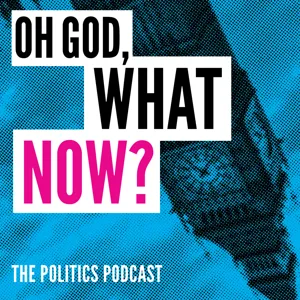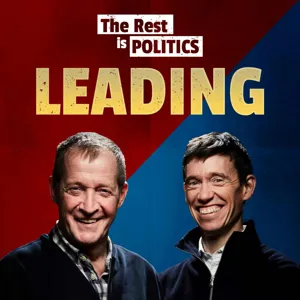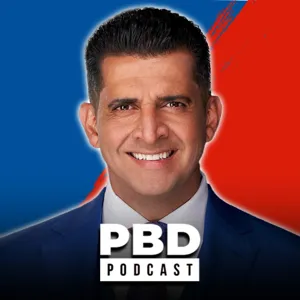Podcast Summary
Navigating the complexities of modern politics: Understanding the nuances of complex political issues requires effective communication, context, and a willingness to engage in open dialogue.
The complexities of modern politics were on full display during this episode of Oh God What Now?, as the panel discussed various topics ranging from Brexit to Israeli-Palestinian tensions and the role of traditional values in political affiliations. Boris Johnson faced criticism from his former advisor, Dominic Cummings, during the COVID inquiry, highlighting the challenges of finding balance in contentious issues. Alex Andreu emphasized the need for context and open communication in diplomacy, while Zoe Grunewald discussed the role of tradition and social welfare in political ideologies. Additionally, the panel touched on the impact of Elon Musk's ownership of Twitter and the ongoing tensions in the Middle East. Overall, the episode underscored the importance of nuanced understanding and effective communication in navigating the complexities of contemporary politics.
Challenges faced by UK towns due to austerity and underinvestment: Towns require long-term investment and proper funding for essential services to tackle issues like antisocial behavior and youth unemployment, emphasizing the urgency for immediate action due to the severity of the situation and the chaotic state of government during the pandemic.
The discussion highlights the challenges faced by towns in the UK due to a decade of austerity and underinvestment. The towns fund, while well-intended, may not be enough to address the root causes of issues in these areas. The conversation also touches upon the chaotic state of government during the COVID-19 pandemic, with Dominic Cummings' testimony revealing a lack of leadership and coordination. The tone of the conversation emphasizes the severity of these issues and the urgency for meaningful solutions. Peter Foster, the Financial Times public policy editor, emphasizes that towns need long-term investment and proper funding for essential services to tackle issues like antisocial behavior and youth unemployment. The culture shock of the conversations and the revelation that those in power thought they had time for these issues underscores the need for immediate action.
UK Government's Overconfident Mindset Exposed During Pandemic: The UK government's overconfident and ego-driven attitude during the pandemic led to a lack of preparedness and accountability, ultimately putting the country at risk.
During the height of the pandemic, the UK government was caught off guard due to their overconfident and ego-driven mindset. Martin Reynolds, a key figure in Boris Johnson's campaign, admitted that they were planning grand things for the country after winning the election with a large majority. However, the pandemic hit at the worst possible moment, exposing the government's lack of preparedness. Reynolds described the culture as one that came in and kicked stuff over and saw what happens, which is why they couldn't afford such an attitude when in power. The government's disregard for the state of the country and their own unsuitability to lead was evident, yet they still chose to roll the dice and take the risk. Boris Johnson, who was described as someone who was an idiot but would be good at indecision, immorality, and lying, was seen as the wrong person to lead during a crisis. Despite this, his proxies defended him and even suggested that they had managed him better than others. The government's handling of the pandemic and subsequent inquiry showed a lack of accountability and a disregard for the gravity of the situation.
The prime minister sets the tone and is ultimately responsible for decisions: The prime minister is accountable for decisions, even when delegating responsibilities, and must face consequences in the House of Commons and at elections.
The prime minister sets the tone and is ultimately responsible for the decisions made in their department, even if they delegate some responsibilities to advisors or civil servants. The accountability lies with the elected officials, and they must make the final choices, facing the consequences in the House of Commons and at the next election. The blurring of lines between the roles of the prime minister, advisors, and civil servants can make it challenging to assign blame, but ultimately, the prime minister's inability to make decisions and listen to advice is their responsibility. While external factors and political context may influence decisions, good civil servants understand this and can only do so much until the buck stops with the minister.
UK Government's Response to COVID-19: Lack of Internal Rational Structure: The UK government's inconsistent decision-making during the COVID-19 pandemic was due to Prime Minister Boris Johnson's lack of a clear internal rational structure, resulting in confusion, disregard for expert advice, and a corrosive impact on policy-making.
The COVID-19 pandemic presented unprecedented challenges for the UK government, particularly for Prime Minister Boris Johnson. Johnson's lack of a consistent internal rational structure led to confusion and inconsistency in decision-making, exacerbated by the complex nature of the crisis and the moonshot culture that dominated the government's approach. The absence of a plan, combined with the belief in their own abilities, resulted in a corrosive impact on British policy-making. This situation was uniquely unfortunate, as no government would have been able to navigate the pandemic's complexities easily. However, the extent of the government's disregard for expert advice and their own internal doubts set the UK apart from other governments during this time.
Brexit strained UK's policy-making machinery, hindering pandemic response: Effective communication and collaboration between civil servants and politicians is crucial during crises to mitigate the negative impact of strained relationships and prepare for unforeseen challenges.
The UK's response to the COVID-19 pandemic was hindered by the existing strains in its policy-making machinery due to Brexit. The civil-servant-politician relationship was already under pressure, and the UK's lack of preparation for a pandemic, specifically regarding PPE and stockpiling, worsened the situation. The government was consumed by the pandemic response, leaving little room for other policy making. The mindset of exceptionalism and denial, which was prevalent during the Brexit negotiations, also impacted the UK's response to the pandemic. The slow recognition of the severity of the situation and the reluctance to implement a lockdown despite the advice of experts further delayed the response. This incident highlights the importance of effective communication and collaboration between civil servants and politicians, especially during crises.
Brexit and COVID-19: Complex Interconnections: Despite the simplistic 'take back control' slogan, both Brexit and the pandemic response involve complexities in implementation, leading to strained relationships and disconnects between decisions and operations.
The UK's handling of the COVID-19 pandemic and its approach to Brexit are interconnected in their complexity. The simplicity of Brexit's "take back control" slogan belied the complexities of implementing it, much like the simplicity of "build ventilators" during the pandemic. However, the focus on Brexit as the root cause of the UK's current challenges oversimplifies the situation. The financial crisis and the rise of populist politics set the stage for both Brexit and the pandemic response. The real challenge came when trying to turn simple answers into reality, leading to strained relationships between politicians and civil servants, and a disconnect between political decisions and operational implementation. Looking ahead, the focus on economic recovery and getting people back to work will likely bring more attention to these complexities. The balance between what politicians, businesses, and scientists want will be crucial in navigating these challenges.
Refocusing on economic implications of Brexit: Moving past emotional aspects, focusing on economic growth and productivity is vital for UK's income and investment amid Brexit and global trade issues.
Learning from this discussion with Peter Foster is that it's essential to move past the emotional and divisive aspects of Brexit and focus on the economic implications to find solutions. Foster argues that the UK's trade relations with its neighbors, particularly in industries like automotive, have been significantly impacted by Brexit. He believes that refocusing the conversation on economic growth and productivity is crucial for generating income and investment in the UK, which is currently in a challenging position due to Brexit and global trade issues. Foster also shares that he was asked to write the book, and its success came as a surprise due to the initial lack of interest in Brexit-related books.
Brexit's Costly Consequences: A Living Crisis, Weaker Economy, and Weaker NHS: Brexit's hardline negotiation stance, extreme camps, and political missteps led to a costlier living crisis, weaker economy, and weaker NHS, with long-lasting implications for UK citizens.
The Brexit process has led to a costlier living crisis, weaker economy, and weaker NHS according to polls, and the Tory government's inability to change this fundamentally due to their authorship of it. The hardline EU negotiation stance and the extreme wings of both remain and leave camps crushing the center further complicated the situation. The potential moment for a minimally damaging Brexit might have been during Theresa May's deal, but it was undermined by her unrealistic expectations and unhelpful civil servants. The Conservative Party's shift towards the right, including the "F**k Business" moment, was more significant than we initially gave it credit for due to the lack of understanding and representation of business in political discussions. Overall, the Brexit process has been messy and costly, with significant implications for the economy and people's livelihoods.
Boris Johnson's Misunderstood Narrative on Single Membership: Boris Johnson and allies' anti-single membership narrative lacked economic basis, ignored business concerns, and misunderstood regulation's role in enabling trade.
The Brexit narrative peddled by Boris Johnson and his allies for years, portraying single membership as a burden and a hindrance to the country's growth, was largely devoid of a solid economic or business case. This narrative came into conflict with reality when businesses expressed their opposition to a no-deal Brexit and separate sets of regulations. Despite this, the government chose to ignore business concerns and forged ahead with their plans, disregarding the importance of regulation as an enabler for business and trade. This fundamental misunderstanding of business and entrepreneurship, coupled with a disregard for proper risk assessment and contingency planning, has been a recurring theme in policy decision-making during the pandemic. Unfortunately, many politicians involved in the UK side have shown a reluctance to engage with the facts and complexities of trading arrangements, contributing to a lack of understanding of the basics.
UK's Unexpected Complexities in Implementing Post-Brexit Regulations: The UK's exit from the EU brought unexpected complexities and costs in implementing new regulations, impacting investment decisions, client relationships, and future expansion.
The UK's departure from the European Union (EU) brought back control of regulations that had been formulated in Brussels, but implementing them domestically revealed unexpected complexities and costs. The pipeline of regulation creation and implementation was largely unnoticed, and when the UK left, politicians found themselves in unfamiliar territory. The new Labor government under Keir Starmer aims for a neighborhood relationship with the EU, but alignment doesn't guarantee access to EU markets without additional paperwork and checks. These frictional costs can impact investment decisions, client relationships, and future expansion. The UK's economy had grown intertwined with the EU's, and unwinding that relationship is proving to be a complex and ongoing process.
Brexit's complex consequences: The decisions made during Brexit implementation have long-term, far-reaching consequences, and the lack of serious conversation about the UK's economic future is concerning.
The decisions made during the implementation of Brexit, particularly regarding trade and regulations, have far-reaching and complex consequences that will continue to unfold over time. The ratchet effect of divergence between the UK and EU means that small wins now could lead to bigger losses down the line. There are no quick fixes or easy solutions, and the lack of serious conversation about the UK's economic future and offerings is concerning. The internalization of the Brexit nondiscussion in political reporting and speeches further highlights the need for a comprehensive and open dialogue about the UK's economic future. The next time a new challenge arises on the production line, such as sourcing angle brackets, these structural uncertainties and complexities will continue to be a factor.
Brexit's Wider Implications for the EU: Political leaders like Starmer must navigate Brexit's cultural symbolism and potential reactions from both sides while considering the economic and political implications.
The Brexit discussion is often focused solely on Britain's perspective, ignoring the wider implications for the EU. However, as the economic impacts of Brexit become more apparent, public opinion may be shifting towards reconsidering the relationship with the EU. For political leaders like Starmer, navigating this sensitive issue requires careful consideration of the cultural symbolism of Brexit and the potential reactions from both pro- and anti-Brexit camps. The question of how sticky the sense of disappointment among Brexit supporters is remains unanswered, as some may hold onto their beliefs despite growing dissatisfaction with the current state of affairs. Ultimately, the Brexit debate goes beyond just the economic and political implications, touching on deeper cultural and national identity issues.
Rebuilding UK-EU relations from the grassroots level: Starmer advocates for a top-level agreement with the EU, focusing on neighborhood collaboration and addressing public perception of Europe as an imposed entity.
The slow progress of mending UK-EU relations post-Brexit is due to the deeply ingrained perception of Europe as an imposed entity. Therefore, any efforts to improve ties must come from the grassroots level, with politicians like Starmer aligning with public opinion. To start the process, the UK could establish a top-level agreement with the EU, acting as a neighborhood player, and collaborating on initiatives like Ukraine rebuilding, carbon schemes, and regulation alignment. This approach could potentially unwind the cost of Brexit, but it won't yield immediate results and may face political opposition. However, it's crucial for the UK to rejoin international discussions and forums to regain its global influence. In essence, Starmer's role is to make a positive case for closer ties with Europe, addressing the paranoia and misconceptions built into the Brexit project.
Twitter's Significant Role in People's Lives: People continue to use Twitter despite its declining value and usership due to the importance of their established profiles, followers, and connections on the platform, and the lack of a suitable alternative.
Despite Elon Musk's acquisition of Twitter one year ago not going as planned, with the platform's value dropping significantly and a decline in usership, many people continue to use Twitter due to the significant role it plays in their lives. People have built up their profiles, followers, and connections on Twitter over the years, making the idea of starting from scratch on a new platform a daunting prospect. Additionally, the lack of a suitable alternative has kept users hanging on. While some may have accounts on other platforms, the majority of their network remains on Twitter. This was a teaser for the bonus bit of the podcast. If you'd like more "Oh God, What Now?" content each week, consider becoming a patron for as little as £3 a month. You'll get the weekly mini cast, merchandise, and the podcast ad-free and a day early.






